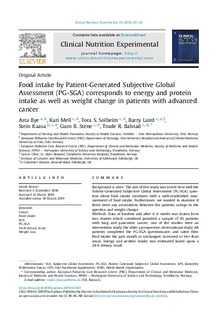| dc.contributor.author | Bye, Asta | |
| dc.contributor.author | Meli, Kari | |
| dc.contributor.author | Solheim, Tora Skeidsvoll | |
| dc.contributor.author | Laird, Barry J | |
| dc.contributor.author | Kaasa, Stein | |
| dc.contributor.author | Stene, Guro Birgitte | |
| dc.contributor.author | Balstad, Trude Rakel | |
| dc.date.accessioned | 2019-09-24T10:32:59Z | |
| dc.date.available | 2019-09-24T10:32:59Z | |
| dc.date.created | 2019-08-22T15:26:02Z | |
| dc.date.issued | 2019 | |
| dc.identifier.citation | Clinical Nutrition Experimental. 2019, 25 20-28. | nb_NO |
| dc.identifier.issn | 2352-9393 | |
| dc.identifier.uri | http://hdl.handle.net/11250/2618447 | |
| dc.description.abstract | Background & aims
The aim of this study was to test how well the Patient-Generated Subjective Global Assessment (PG-SGA) question about food intake correlates with a well-established measurement of food intake. Furthermore, we wanted to examine if there were any associations between the patients ratings to the question and weight change.
Methods
Data at baseline and after 4–6 weeks was drawn from two studies which combined provided a sample of 85 patients with lung and pancreatic cancer; one of the studies were an intervention study, the other a prospective, observational study. All patients completed the PG-SGA questionnaire, and rated their food intake the past month as unchanged, increased or less than usual. Energy and protein intake was estimated based upon a 24-h dietary recall.
Results
Patients reporting a food intake less than usual had a lower energy (24.2 vs 30.3 kcal/kg/day, p = 0.02) and protein (1.0 vs 1.2 g/kg/day, p = 0.07) intake at baseline compared to patients reporting unchanged or increased food intake. After comparison at 4–6 weeks, patients reporting a food intake less than usual, had a lower energy (24.5 vs 31.7 kcal/kg/day, p = 0.07) and protein (0.9 vs 1.3 g/kg/day, p = 0.003) intake. Patients reporting a food intake less than usual the past month lost more weight than patients with an unchanged or increased intake (−2.6 kg versus 0.7 kg respectively, p < 0.001).
Conclusions
This study show that self-reported food intake measured by PG-SGA corresponds to measured energy and protein intake as well to weight change on a group level. This indicates that patients self-report of food intake can be used as a valid indication of food intake in patients with advanced cancer. Further investigation of the psychometric properties of the question is necessary to evaluate how well the question performs on an individual level. | nb_NO |
| dc.language.iso | eng | nb_NO |
| dc.publisher | Elsevier | nb_NO |
| dc.rights | Attribution-NonCommercial-NoDerivatives 4.0 Internasjonal | * |
| dc.rights.uri | http://creativecommons.org/licenses/by-nc-nd/4.0/deed.no | * |
| dc.title | Food intake by Patient-Generated Subjective Global Assessment (PG-SGA) corresponds to energy and protein intake as well as weight change in patients with advanced cancer | nb_NO |
| dc.type | Journal article | nb_NO |
| dc.type | Peer reviewed | nb_NO |
| dc.description.version | publishedVersion | nb_NO |
| dc.source.pagenumber | 20-28 | nb_NO |
| dc.source.volume | 25 | nb_NO |
| dc.source.journal | Clinical Nutrition Experimental | nb_NO |
| dc.identifier.doi | 10.1016/j.yclnex.2019.03.003 | |
| dc.identifier.cristin | 1718107 | |
| dc.description.localcode | © 2019 The Authors. Published by Elsevier Ltd on behalf of European Society for Clinical Nutrition and Metabolism. Thisis an open access article under the CC BY-NC-ND license (http://creativecommons.org/licenses/by-nc-nd/4.0/). | nb_NO |
| cristin.unitcode | 194,65,15,0 | |
| cristin.unitcode | 1920,12,0,0 | |
| cristin.unitcode | 194,65,30,0 | |
| cristin.unitname | Institutt for klinisk og molekylær medisin | |
| cristin.unitname | Kreftklinikken | |
| cristin.unitname | Institutt for nevromedisin og bevegelsesvitenskap | |
| cristin.ispublished | true | |
| cristin.fulltext | original | |
| cristin.qualitycode | 1 | |

